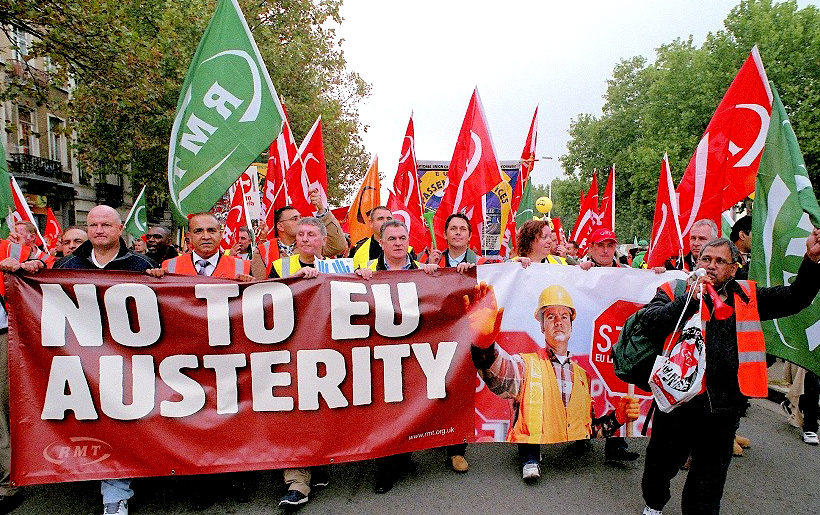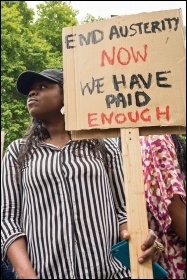Editorial of the Socialist issue 1043
May ends in June! Boot out the Tories!
We call on Corbyn: fight for a general election on socialist policies
May’s a goner! We face a summer Tory leadership contest but we need a general election to get the Tories Out! The article below, written just before May’s resignation speech, outlines the tasks the workers’ movement faces.
The euro-elections were never meant to happen. The fact that they are even taking place is an utter humiliation for Theresa May and the Tories. They are bringing to the forefront again the historic crisis of British capitalism and the rage of masses of working class and young people.
In 2016, the Socialist Party campaigned for a socialist Brexit, understanding that the enormous working-class anger against austerity, the rich and the capitalist politicians could find an outlet in the EU referendum. We said that a Brexit vote could be a cry of rage, and could throw the Tories, the capitalist class and all its institutions into crisis.
It is expected that on Thursday there will be a total collapse of the Tories. A YouGov poll over the weekend put them in fifth place behind the Green Party, on just 8.3%.
Now Lord Heseltine, former deputy Prime Minister, has had the whip suspended for saying he would vote Lib Dem.
The Tories, the oldest and most successful party of capitalism on the planet, is in meltdown.
Theresa May had said she would stay as prime minister until the Brexit deal was passed, but in yet another defeat she has now told the Tory back-bench 1922 committee that she will stand down after she has put the withdrawal bill back to parliament in the first week of June. This would then mean a summer Tory leadership contest.
The challenge for her successor is well under way, with multiple contenders, including current front-runner Boris Johnson. Any hope that this will ease Tory troubles could be short-lived.
Their problem is that whoever would be the replacement could split the party. It is the hard-line Brexiteers who have currently come out on top. They wanted an early contest to give them time to negotiate a different deal or allow a no-deal exit by the new Brexit date, 31 October. The Remainers wanted to keep May in until Brexit was “sorted”. A leadership election could be the trigger for an actual split.
But despite this catastrophe for the Tory Party, in Thursday’s election it is not the Labour Party that will be the gainer.
The same YouGov poll showed that three in five people in Britain say politics in Westminster and Brussels is broken. That is the view of 90% of those planning to vote for Nigel Farage’s new Brexit Party.
The Brexit Party is on course to score twice as many votes as any other party – on 34%. At the weekend, the Lib Dems were on 17%, with just 16% for Labour and 9% for the Green Party.
The combined total votes for the Brexit Party and Ukip were predicted to be 36%, and the combined vote of pro-remain Lib Dems, Greens, Change UK, Scottish National Party and Plaid Cymru was expected to be 37.5%.
Determined to do their best to undermine Corbyn, just days before the election the Blairites stepped up their attacks – probably disappointed that ‘Change UK’ (made up of right-wing Labour defectors and renegade Remainer Tories) has so far flopped and not undermined Labour sufficiently. Former Blair minister Jane Kennedy, who resigned from the Labour Party, claimed Labour is “broken to the core”, hijacked by “something really nasty and dark in the hard left”. Margaret Hodge calls for a vote for a pro-EU party, not Labour.
Blairites – both MPs and commentators like Polly Toynbee – have of course continued to argue that the Labour Party should campaign for Remain. Pollster Peter Kellner argued the same case, on the basis that two thirds of Labour’s 2017 voters are for Remain, and that a large part of Labour’s vote is haemorrhaging to the Lib Dems.
This ignores the fact that many Labour voters were lost before the 2017 election because of Labour’s previous betrayals. Over the course of Tony Blair’s premiership, five million votes were lost. In 2017 Labour won the biggest increase since 1945, but it still left millions of working-class people looking for a voice.
Corbyn is right not to capitulate to the Remainers this time – as he did in the referendum in 2016. That was a serious mistake that left the leadership of millions of angry working-class people in the hands of right-wingers like Farage and Johnson.
But unfortunately, months upon months of concessions to the Blairites, including allowing Blairite Remainers like Keir Starmer take centre-stage on Brexit, has muted Corbyn’s more radical voice and allowed confusion over Labour’s Brexit position.
Brexit Party
In this euro-election campaign, thousands of people are attending Brexit Party rallies. Farage claims 100,000 have joined the party.
He is purposefully putting forward no policies other than a WTO (ie no-deal) Brexit. Of course, this is because his political views on privatisation, including of the NHS, austerity, as well as his racism, would alienate large numbers of people.
But Farage is tapping into a strong sense of betrayal. Saying that ‘we need to get rid of the politicians’ is a strong message.
“It has got nothing to do with Leave or Remain. It is social class. The elitists. The us and the them.” These are the words of people attending a Brexit rally in Merthyr Tydfil, quoted in the Guardian.
“They always used to say Labour was for the working class,” says another. “Now I seem to think that Labour is just getting into bed with the Conservatives, and they are the upper middle class. I honestly think Brexit is the new working-class party for poverty-stricken towns”.
The capitalist press mock, and ask questions about Farage’s donors. But it doesn’t wash with many angry people. Some attending his rallies are reported as saying they don’t like Farage, but for them that’s not the point. They feel they are not being listened to. Wages are still below pre-crisis levels. In-work poverty is at a record high, and new figures show that in ten constituencies child poverty is now above 50%. Household debt is at a record high. The ‘elites’ lecturing and sneering didn’t work in 2016 and doesn’t appear to be working now.
Many of those Corbyn supporters who are now saying they could vote for ‘Remain parties’ are expressing, in a different way, a similar sentiment – anger and fear for the future, especially among young people. For them, the sudden rise of the Brexit Party is part of what they fear.
A new survey by Opinium shows that, since the EU referendum, there has been an increase in the number of Black and Asian people experiencing racism – up to seven in ten, from 58% in January 2016. The survey concludes that racists are becoming more confident – with the racist rhetoric from Ukip, the high profile of figures like Tommy Robinson, and the encouragement of fears about immigration by ‘mainstream’ politicians and the capitalist press.
We have witnessed the growth of right-wing populism and even the far right in some countries recently – most notably Trump in the US and Bolsonaro in Brazil. The Socialist Party warned of the possible rise of the right if the workers’ movement didn’t step up to the plate to fight the efforts of the rich and big business to force working-class people to pay for economic crisis through austerity.
But the sudden electoral rise of the Brexit Party is not necessarily long-term. In the 2017 general election, it was Jeremy Corbyn that thousands and thousands of people flocked to rallies to hear. In two weeks, thousands will march against Nigel Farage’s friend Donald Trump when he visits Britain.
That the Brexit Party is currently being seen as a weapon against the austerity establishment, and the 2017 surge behind Corbyn’s anti-austerity programme are ultimately both expressions of the need to build a mass independent political voice of the working class.
Therefore it would be a crude response to simply think that these Brexit Party rallies must be opposed by the ‘anti-racists’. People are turning out to them because they feel betrayed and can see a way to beat the establishment politicians. It is vital that a pro-working class, socialist alternative is offered.
The collapse of the Tories could precipitate a general election. We call for Corbyn and the trade union leaders to mount a massive fight to boot them out. But even without that, in this volatile time, there is the potential for a Corbyn-led government coming to power possibly in the next months.
The Brexit Party will be standing in a general election too, but when expected to put forward a wider programme, Farage’s anti-working-class policies would be more exposed. The punishment being meted out to the main parties in these euro-elections wouldn’t be repeated in the same way when the question of governmental power is posed.
But Corbyn must learn the lessons from recent weeks. A general election would be the chance to put a pro-working-class socialist stamp on events. Enough with the compromises and concessions to the pro-capitalist right in his own party, people like Margaret Hodge. The so-called ‘liberal centre ground’ – in other words, austerity capitalism – is not the winner in the euro-elections. This is a polarisation stemming from raw anger.
The general election, when it comes, needs to be a battle between the backward, right-wing ideas of the divided Tories and Farage, and a bold working class-based socialist movement around Corbyn.
That means the democratic steps the Socialist Party has argued for from day one of Corbyn’s leadership victory – most urgently the opportunity for members to kick out the pro-capitalist Blairite MPs through an automatic reselection process – remain essential. The anger against the politicians is a warning to Corbyn. Kick out the pro-capitalist politicians in the Labour Party!
What is needed is not just ousting the Tories but to fight for a real working-class party. Such a party would mean not just passive voting and expressions of anger, but active participation of working class people in building their own party. As an illustration of what could be built, in the 1980s in Liverpool, when supporters of the Socialist Party’s predecessor, Militant, led a socialist Labour council, thousands of people, including hundreds of trade union reps, participated in the District Labour Party meetings. A mass movement and a working-class party that can implement socialist policies are essential.










